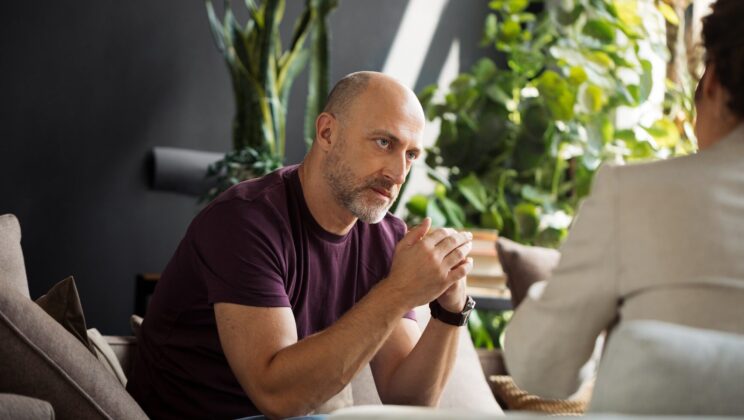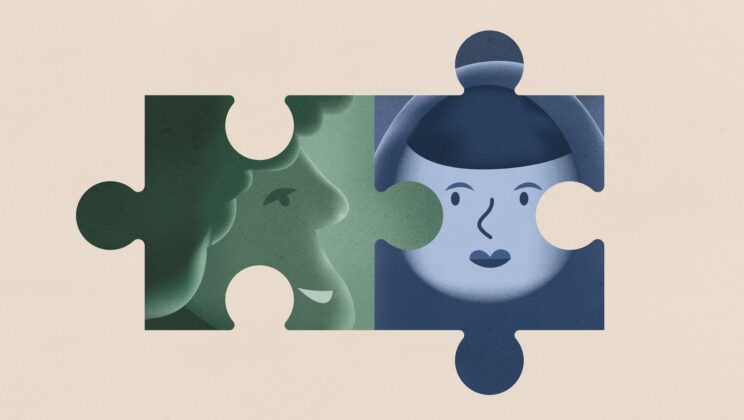Group Therapy: Is it Right for you?
June 13, 2023
When we think of therapy, most of us likely picture one-on-one sessions in a therapist’s office. But group therapy can be equally transformative for people with mental health disorders or those facing tough times. For some, it’s the first time they feel safe enough to talk openly and get support from others who share their struggles. Group counseling can help break through the mental health stigma that keeps many people from getting the help they need—and research has shown that it can be as effective as individual therapy. People in therapy groups are able to learn, grow, and heal together and find comfort knowing they’re not alone.
What is group therapy?
Group therapy can help you gain knowledge and skills to manage mental health disorders, trauma, grief, chronic pain, illness, and other issues. In group counseling, one or more health care providers treat multiple people who share similar challenges. Therapy groups usually consist of five to 15 members and tend to focus on topics like psychoeducation, coping skills, relationships, and behavior change. Group therapy sessions typically last 60 to 90 minutes in settings like therapy practices, hospitals, community centers, and inpatient or outpatient treatment centers.
Types of group therapy
Different types of group therapy are available for different needs. While some therapy groups are educational, others focus on interactions between group members or learning a skill.
Psychoeducational groups
Psychoeducational groups provide education about mental health topics like anger management, addiction, relationships, phobias, trauma, stress management, and emotional wellness. Psychoeducational groups can also teach you about a mental health diagnosis and how to live with it more effectively. Group facilitators take on a teacher role and the group follows a similar structure each week. In this type of group, facilitators may do more talking than in other group therapy formats, but group participation and interaction are still important components.
Skills development groups
Skills development groups use education and group therapy activities to help you develop tools to address challenges. This type of group therapy may include “homework” to put learning into practice outside of the group. For example, skills development groups may focus on a particular treatment modality like dialectical behavior therapy (DBT) where the facilitator teaches principles such as accepting thoughts and feelings without judging them. You might practice applying these principles to emotions that come up during group therapy and then in real-world situations between group sessions.
Interpersonal process groups
Interpersonal groups are more focused on interactions between group members than specific topics. These groups are often unstructured and focus on the here and now, allowing group members to process their emotions as they happen. A lot of the work in interpersonal process groups happens around the therapy group dynamic. The group itself is also used to explore relational issues that participants experience in their everyday lives. Relationship themes that naturally arise in interpersonal groups may include conflict, assertiveness, authentic communication, forgiveness, grief, and family roles. Through interactions with other group members, you can learn tools for conflict resolution, boundary setting, healthy behaviors, and more effectively communicating with others.
Cognitive behavioral groups
Cognitive behavioral groups center around the principles of cognitive behavioral therapy (CBT), which are effective in treating a number of mental health challenges. With the help of the group facilitator, you identify how maladaptive and negative thoughts fuel behaviors and how those behaviors affect your thoughts and feelings. You learn to reframe negative thoughts with the input of other group participants who may be able to view the situation objectively and help you see things from different points of view.
Support groups
Support groups are run by group members instead of professionals. These types of groups provide emotional support through shared experiences with others. Support groups can help you build coping skills in a safe space with others who can relate to your experiences. There are a myriad of support groups for challenges like substance use, divorce, autism, codependency, gambling, cancer, and disordered eating. Support groups often take place in community centers or churches and may accept donations from members to pay for a rented space or refreshments.
What is group therapy like?
Therapy groups aren't what they look like on television. You won’t be forced to stand up and say your name and why you’re there. You don’t have to talk right away or at all. Healing can still happen even if you don't share—though the more you engage with other members, the more you’ll get out of it.
In group therapy, you’ll hear from other people in similar situations as you. This opportunity to hear others’ stories not only helps you feel less isolated in your struggles but can also open up new perspectives. One of the benefits of group therapy is seeing how other people are dealing with the same issues as you. It’s also encouraging to see people who’ve been where you are and come through it.
Therapy groups can be open or closed. Open groups have rolling admissions, meaning the group is ongoing and you can join any time. Alcoholics Anonymous (AA) is an example of a group with open meetings. Closed groups start and end with the same members. These types of group therapy usually last three to six months. Cognitive behavioral therapy groups are an example of a closed group. A closed therapy group typically follows the stages of group therapy model:
#1 Forming or orienting - In this beginning stage, the group facilitator talks to prospective members and forms the group. In the first group session they establish group rules and structure. These may include things like who talks when, confidentiality expectations, attendance requirements, and respecting other members.
#2 Storming or transition - After a few sessions, you’ll become more comfortable with one another. Members are figuring out their place in the group and the structure of the group flows better. During this time, conflict naturally arises and is expected.
#3 Norming or cohesiveness - In this stage of group therapy, there’s a synergy between group members. The therapy group is like one unit. You’ve learned how to resolve conflict, acknowledge strengths, and maintain overall harmony.
#4 Performing or working - This phase is an extension of the norming phase. You’re refining interpersonal skills and continuing to practice ways of resolving conflict, sharing, and providing feedback.
#5 Adjourning or termination - The final stage of group therapy is a time to gain closure. Group members acknowledge achievements, resolve any unfinished business, and say goodbyes. This may come with grief or sadness if you’ve built strong bonds with fellow group members and the facilitator.
Benefits of group therapy
Group therapy has been proven to improve symptoms of severe mental illness, treatment-resistant depression, trauma, anxiety, eating disorders, substance use disorders, and ADHD. What follows are some more key benefits of group therapy.
Giving and receiving support
Group counseling is not only a place to get support from your peers, but also to give support, which can be healing, too. You’ll learn to care for other members and talk them through situations in a real and raw way they can relate to, and they’ll do the same for you.
Hearing different perspectives
Group becomes a microcosm of society. You'll likely interact with people from different backgrounds, ages, and socioeconomic status. Because you’ve all had different experiences, members can provide feedback and solutions they’ve used in their own lives that others may not have considered.
Feeling less isolated
Group therapy can provide an extra layer of support for people who may feel lost and alone.
There’s still stigma around mental health, though it’s getting better. Research shows a decrease in social stigma for depression but not other mental health conditions like schizophrenia and alcohol use disorders. Just knowing there's someone else who's experienced the same thing can be impactful. Group counseling can be particularly effective for marginalized identities like people of color and those who identify as LGBTQIA+ by helping them cope with universal stressors like discrimination, violence, and stigma.
That same decline in stigma has not yet happened for other mental disorders. In fact, public perceptions attributing dangerousness to schizophrenia and lack of morality to alcohol dependence have grown.
However, data from 2006 to 2018 revealed a statistically significant drop in social rejection for people described as having major depression. Across a number of social contexts, including the workplace, the family and the neighborhood, fewer Americans in the 2018 study compared to the 2006 study expressed an unwillingness to interact with people described as having major depression.
Building a positive support system
Community and social support is a protective factor for mental health disorders and other challenges. Group therapy is a positive reminder that you’re not alone and that others understand what you’re going through and are there when you need help.
Healing relationships outside of group therapy
Conflict is a normal and expected part of group therapy. Similar difficulties with relationships outside of the group naturally arise in group psychotherapy settings because interpersonal conflict is inevitable. You’re probably using similar ways of relating to people in therapy groups as you do with others in your life.
You may find that the way another member said something reminded you of someone who harmed you and it makes you angry, or maybe a group member reminds you of a family member you have conflict with. When these people talk in groups, you’re triggered—a natural response. What's helpful is that it's happening in a setting with a facilitator and group members who can observe and acknowledge your reaction and provide feedback that you wouldn’t get in everyday life.
Disadvantages of group therapy
Group therapy alone doesn’t always provide the holistic care people may need based on their condition, time in treatment, and personal preferences. Other disadvantages to group therapy include:
Less individual attention
In individual therapy you get dedicated one-on-one time with a mental health professional. Group counseling offers less personalized attention since the facilitator is interacting with every member.
Less scheduling flexibility
Typically if you’re seeing an individual therapist you meet at the same time every week, and since it’s just you and the therapist it’s easier to reschedule if needed. Group therapy meets on the same days and times every week, so you can’t reschedule if something comes up. An important component of group psychotherapy is that members are present every time to avoid a break in cohesiveness and group dynamics. It’s important to have consistent attendance to get the most out of group counseling and respect other members’ commitment to the group.
Not a good fit
Group therapy may not be a good fit for everyone. Ideally, during intake assessments the facilitator makes sure each member is a good fit, but sometimes a member may cause a rupture in the group, inconsistently attend, or prevent sessions from running smoothly.
Is group therapy for you?
Many times you don’t have to choose between individual or group counseling—they work well together. Individual therapy helps you address issues one on one with a therapist and get more personalized treatment. Group therapy provides an extra layer of support and opportunities to practice the skills learned in individual therapy.
Group psychotherapy is helpful if you’ve already done some work on your own, such as individual therapy. This gives you a level of awareness of where you are and what challenges you’d like to address in the group. If you have a serious or complex mental health disorder, group therapy isn’t usually the first place to start. You may need to get to a more stable space with your mental health through individual therapy, and potentially medication, before reaping all the advantages of group therapy. Combining therapy groups and individual therapy in these instances can be very effective.
Another factor to consider before beginning group therapy is the time commitment. Committing to a set time every week is important in group therapy because consistency in treatment improves outcome. If you’re unable to do so, you may prefer individual therapy, where scheduling is more flexible. You may also consider an open group that’s less dependent on all members being present for several months.
Shy or introverted people may think group therapy activities aren't for them, but that’s untrue. Even if you’re not comfortable talking, as long as you’re willing to engage, you can get something out of it. This means being present, listening to what others say, and applying learnings to your own life. If you just passively sit through a group and aren’t really present, you’re less likely to get the full benefit of it.
Take care of your mental health
Any type of mental health counseling, whether individual or group, can provide significant benefits for your mental well-being. A mental health professional can help you decide if group therapy is right for you.
What type of therapy is right for you?
You can find out today if your employer offers Lyra.
Author
Stacey D. Jones
Stacey has a decade of experience in clinical and administrative behavioral health. She holds a master's degree in mental health counseling from Saint Xavier University and is a licensed clinical professional counselor. Stacey is a clinical quality supervisor for Lyra Health. She has authored publications on imposter syndrome and narcissistic abuse and has a background in trauma, relational issues, and parenting challenges.
Explore additional blogs

Mental health treatment
How Chronic Illness and Mental Health Intersect

Mental health treatment
Should I Go to Therapy? How to Know if It’s Right for You

Mental health treatment